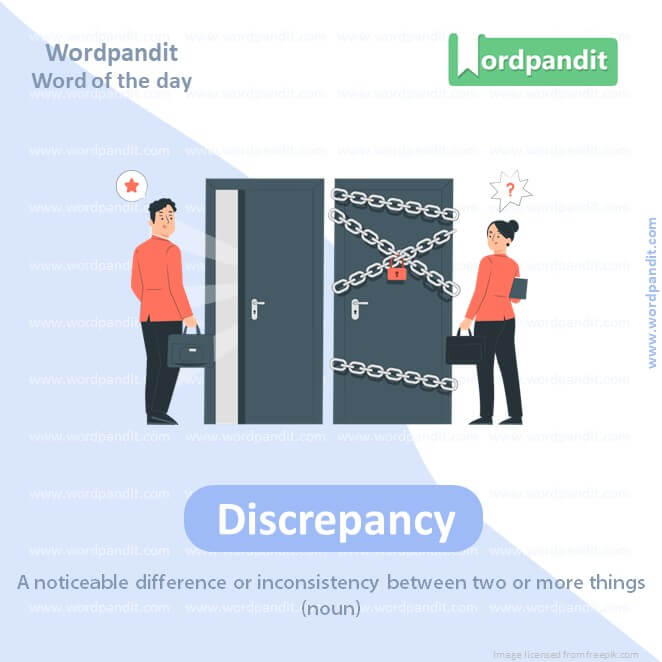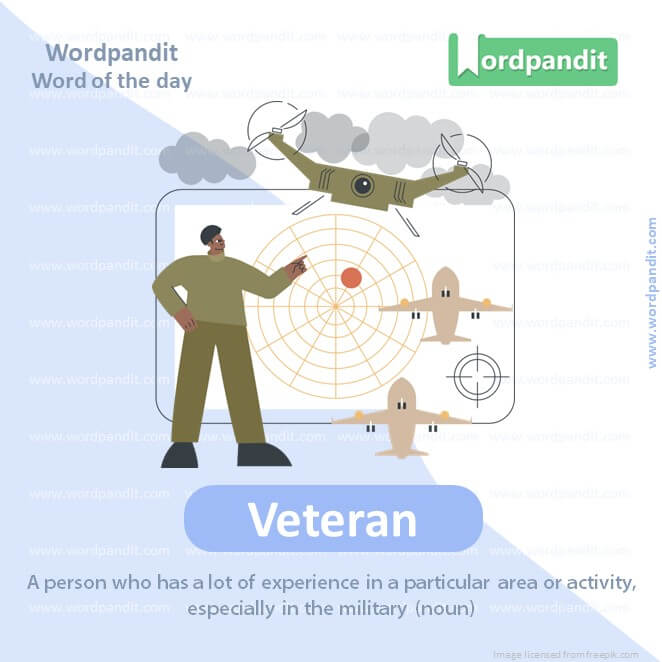Daily Vocabulary Words: List of Daily Used Words
Hi there. Welcome to this special section @ Wordpandit.
Our endeavour here is straightforward: highlighting important daily vocabulary words, you would encounter in The Hindu. This is your repository of commonly used words; essentially, we are posting a list of daily used words. Hence, this has significant practical application as it teaches you words that are commonly used in a leading publication such as The Hindu.
Visit the website daily to learn words from The Hindu.
WORD-1: Digitised
CONTEXT: Numerous commentators have pointed out challenges in the project of linking rural employment guarantees to digitised individual identification systems.
SOURCE: The Hindu
EXPLANATORY PARAGRAPH: Imagine taking a photo with your camera and then putting it on your computer so you can see it on the screen. When something is “digitized,” it means turning things like pictures, documents, or sounds into computer-friendly formats that you can see or hear on electronic devices like computers or phones.
MEANING: Converted into a digital format that can be processed or displayed by a computer or electronic device (verb).
PRONUNCIATION: DIJ-i-tahyzd
SYNONYMS: Digitalized, computerized, electronic, encoded, transformed
USAGE EXAMPLES:
1. The old books were digitized to preserve them for future generations.
2. The company’s records were digitized for easier access and storage.
3. Digitized music allows us to listen to our favorite songs on digital devices.
4. The museum digitized ancient artifacts to make them accessible online.

WORD-2: Discrepancy
CONTEXT: These include Internet connectivity, fingerprint recognition issues, difficulties faced by the disabled, unrecorded working days, name duplication, lack of awareness, errors in linking, authentication, elimination of names, discrepancy in name spellings, and issues in seeding — mostly where the workers are little at fault.
SOURCE: The Hindu
EXPLANATORY PARAGRAPH: Imagine you and your friend are counting the number of candies in a jar, but you get different numbers. The difference between your counts is called a “discrepancy.” It means there’s a noticeable difference or inconsistency between two things.
MEANING: A noticeable difference or inconsistency between two or more things (noun).
PRONUNCIATION: dih-SKREP-uhn-see
SYNONYMS: Disparity, difference, inconsistency, variation, discrepancy
USAGE EXAMPLES:
1. There was a discrepancy between the sales figures reported by the two departments.
2. The accountant found a discrepancy in the financial records.
3. The discrepancy in sizes led to confusion among customers.
4. The survey revealed discrepancies in people’s opinions on the issue.

WORD-3: Mercy
CONTEXT: At the foundation of these drawbacks is the fact that workers have been placed at the mercy of technology, contrary to the idealised notion of them being its beneficiaries.
SOURCE: The Hindu
EXPLANATORY PARAGRAPH: Imagine you accidentally break your friend’s toy, and instead of getting mad, your friend forgives you and doesn’t get upset. That act of forgiving and being kind is called “mercy.” It means showing kindness or forgiveness when someone has done something wrong.
MEANING: Compassionate treatment or forgiveness shown towards someone who could be punished or harmed (noun).
PRONUNCIATION: MUR-see
SYNONYMS: Compassion, forgiveness, clemency, leniency, grace
USAGE EXAMPLES:
1. The judge showed mercy and reduced the sentence for the first-time offender.
2. She pleaded for mercy from her parents after making a mistake.
3. Mercy is a virtue that promotes understanding and empathy.
4. The mercy of the volunteers helped the homeless during the cold winter.
WORD-4: Precedence
CONTEXT: Clearly, technology has taken precedence. Employment security seems less a priority and the worker seems even further down the scale.
SOURCE: The Hindu
EXPLANATORY PARAGRAPH: Imagine you and your friend both want to play with the same toy, but your friend lets you go first because you asked nicely. Giving someone the opportunity to go first or giving something more importance is called “precedence.” It means giving priority or importance to something or someone.
MEANING: Priority or higher importance given to something over others (noun).
PRONUNCIATION: PRES-i-duhns
SYNONYMS: Priority, precedence, importance, preference, priority
USAGE EXAMPLES:
1. Safety takes precedence over speed in construction projects.
2. The urgent request was given precedence over other tasks.
3. The needs of the children take precedence in family decision-making.
4. Precedence is given to customers with appointments.

WORD-5: Cadre
CONTEXT: The BJP, which has 25 MPs and prides itself on the discipline of its cadre, is trying to quell dissidence in more than half a dozen constituencies.
SOURCE: The Hindu
EXPLANATORY PARAGRAPH: Imagine a group of people who are trained and work together as a team, like firefighters or doctors. That organized group with special skills and training is called a “cadre.” It’s like having a team of experts who can handle specific tasks.
MEANING: A small group of trained or skilled individuals who work together as a team, especially in a specialized field (noun).
PRONUNCIATION: KAH-druh
SYNONYMS: Team, group, squad, unit, corps
USAGE EXAMPLES:
1. The cadre of teachers implemented new teaching methods in the school.
2. The company relies on a cadre of engineers for innovative projects.
3. The military cadre underwent rigorous training for their mission.
4. The medical cadre responded quickly to the emergency situation.

WORD-6: Veteran
CONTEXT: In Shivamogga in the hilly Malnad region, BJP veteran leader K.S. Eshwarappa announced his candidature as an independent.
SOURCE: The Hindu
EXPLANATORY PARAGRAPH: Imagine meeting someone who has a lot of experience doing something, like playing a musical instrument or playing a sport. That person who has been doing something for a long time and is very skilled at it is called a “veteran.” It’s like being an expert because you’ve been doing it for a long time.
MEANING: A person who has a lot of experience in a particular area or activity, especially in the military (noun).
PRONUNCIATION: VET-er-uhn
SYNONYMS: Expert, seasoned, experienced, proficient, skilled
USAGE EXAMPLES:
1. The veteran firefighter knew exactly how to handle the situation.
2. She is a veteran journalist with decades of reporting experience.
3. The veteran musician impressed the audience with her performance.
4. Veterans of the industry provided valuable insights during the conference.
WORD-7: Turf
CONTEXT: Similarly, the party was in a bind in Kolar, which witnessed an intense turf war between the lobbies led by Food and Civil Supplies Minister K.H. Muniyappa and former Minister K.R. Ramesh Kumar.
SOURCE: The Hindu
EXPLANATORY PARAGRAPH: Imagine you have a favorite spot in the playground where you always play with your friends. That area that you consider your own and protect is called your “turf.” It’s like having a space or territory that you claim as yours.
MEANING: An area, domain, or territory that someone considers their own, especially in a competitive or protective sense (noun).
PRONUNCIATION: turf
SYNONYMS: Territory, domain, area, zone, region
USAGE EXAMPLES:
1. The gang disputes were often about control of turf in the neighborhood.
2. The company sees the new market as potential turf for expansion.
3. Each team defended their turf fiercely during the sports tournament.
4. He felt like the new employee was encroaching on his turf in the office.

WORD-8: Rebellion
CONTEXT: The party has nominated the children of seven Cabinet ministers, the siblings of two Cabinet ministers, and the wife of a Cabinet minister, many of whom could face problems internally from their adversaries, though there is no open rebellion.
SOURCE: The Hindu
EXPLANATORY PARAGRAPH: Imagine you and your friends are told to sit quietly, but you start making noise and running around instead. That act of going against rules or authority is called “rebellion.” It means resisting or defying authority or established rules.
MEANING: Open resistance or defiance against authority, rules, or norms (noun).
PRONUNCIATION: ri-BEL-yuhn
SYNONYMS: Defiance, resistance, revolt, insurrection, uprising
USAGE EXAMPLES:
1. The rebellion against the oppressive regime grew stronger each day.
2. She was known for her rebellious spirit and nonconformity.
3. The students staged a rebellion against the strict dress code.
4. Rebellion is often a response to perceived injustice or inequality.
WORD-9: Posturing
CONTEXT: These cases of dissidence are expected to die down as the election campaigns progress. Party insiders say the public posturing, meant to extract some concessions from the party, will be addressed.
SOURCE: The Hindu
EXPLANATORY PARAGRAPH: Imagine you’re playing a game of make-believe, pretending to be a superhero or a princess. That act of pretending or acting in a certain way to impress others is called “posturing.” It means presenting oneself in a particular manner, often to appear more impressive or important.
MEANING: Behaving or speaking in a way that is intended to impress or deceive others, often without sincerity (noun).
PRONUNCIATION: POS-chuh-ring
SYNONYMS: Pretense, posing, bluffing, feigning, affectation
USAGE EXAMPLES:
1. His posturing in front of the camera was aimed at gaining attention.
2. The politician’s posturing during the debate was criticized as insincere.
3. She saw through his posturing and recognized his true intentions.
4. Posturing often occurs in competitive environments to gain an advantage.
WORD-10: Clarion
CONTEXT: These recent developments relate to a clarion call for “asymmetric fiscal rules” relating to deficits and debts in India.
SOURCE: The Hindu
EXPLANATORY PARAGRAPH: Imagine you hear a loud and clear trumpet sound that announces something important, like the start of a race or an event. That clear and unmistakable sound that grabs your attention is called “clarion.” It’s like a powerful signal that cannot be ignored.
MEANING: Loud and clear, especially in sound or message; unmistakable (adjective).
PRONUNCIATION: KLAIR-ee-uhn
SYNONYMS: Clear, loud, distinct, unmistakable, resounding
USAGE EXAMPLES:
1. The clarion call for action inspired people to join the movement.
2. Her clarion voice could be heard across the crowded room.
3. The clarion warning signaled the approaching storm.
4. The clarion message of unity resonated with the audience.
Vocabulary Words with Meaning, Synonyms and Antonyms PDF
The voyage to language mastery often involves decoding the ‘vocabulary words with meaning, synonyms and antonyms PDF’. This valuable resource is a treasure chest of words, offering definitions, similar phrases, and contrasting expressions all in one place. Yet, recognizing the full potential of ‘vocabulary words with meaning, synonyms, and antonyms PDF’ entails more than just glossing over the words, it demands active and strategic engagement.
To uncover the richness of ‘vocabulary words with meaning, synonyms and antonyms PDF’, focus on understanding the context of each word, along with its synonyms and antonyms. Group words under themes to create word maps, linking synonyms and contrasting antonyms, for a better grasp of the material.
When delving into a ‘vocabulary words with meaning, synonyms and antonyms PDF’, use annotation tools for an interactive study experience. Make personal notes about each word and how you connect with it. This personalized touch aids in memorization and enhances recall.
To cement the learning from ‘vocabulary words with meaning, synonyms and antonyms PDF’, regular revision is pivotal. Spaced repetition, a learning technique where intervals between each review are gradually increased, can significantly enhance long-term memory retention.
The most crucial aspect, however, is practical application. The ‘vocabulary words with meaning, synonyms and antonyms PDF’ should act as a springboard for real-world application. Incorporating learnt words, along with their synonyms and antonyms, in conversations or digital interactions, reinforces understanding and boosts fluency.
In conclusion, navigating the ‘vocabulary words with meaning, synonyms and antonyms PDF’ is a cerebral adventure. A blend of contextual learning, annotation, regular revision, and practical application makes the journey a rewarding one. Grasping ‘vocabulary words with meaning, synonyms and antonyms PDF’ not only enriches your language skills but also adds vibrancy to your linguistic expressions.













